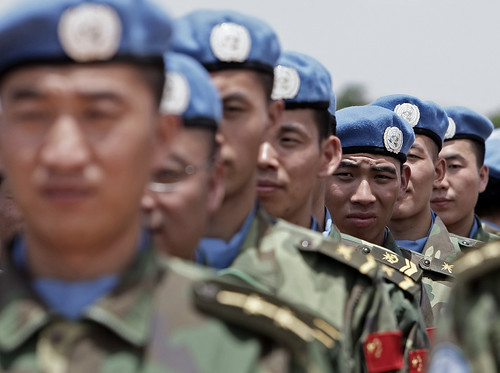
During the 2006 China-Africa summit, which convened officials from 48 African countries, the Chinese government handed out billions of dollars in investment for infrastructure projects and loans, under the banner of “the common pursuit of friendship, peace, cooperation and development” . A year later, the EU tried to copy this language at their EU-Africa summit, held in Lisbon. Much like the ISN’s pro-con discussion last week on foreign investment in Africa, they pointed to the dangers as well as the opportunities in China’s increased engagement with Africa, and pointed fingers at Zimbabwe for violating Human Rights. African leaders were not impressed. They emphasized the colonial past, did not appreciate the finger pointing, and did not find what little investment the EU had to offer very convincing in comparison to China’s hand-outs the year before. The positions of African governments, however, have changed since then. It will be interesting to see how China reacts.
China’s earlier encounters with Africa were quite positive from an African point of view. Under Mao, China gave technical assistance, health care support and started education programs in order to strengthen African societies so that they could revolt against their oppressors and become communist states. China also re-affirmed its commitment to a ‘peaceful rise’ and to its five principles of foreign engagement which included non-interference in the domestic affairs of other countries, equality and mutual benefit. Hence the warm African welcome when China returned to the stage in the 1990s.
This time around, however, China did not come to Africa for purely altruistic reasons. Its renewed interest in the continent is fueled by exponentially growing demands for energy and natural resources. Whereas China used to be almost completely self-sufficient in energy production, it now imports more than 50% of its oil. Its engagement in Africa is seen as a way to diversify its overseas supply, which was traditionally concentrated in the Middle East. Moreover, China is interested in minerals for domestic production and has been looking for new markets where it can sell its cheap consumer goods. It also seems to be trying to solve domestic unemployment by exporting laborers to African lands.
In this context, the warnings of Western officials about Chinese neo-colonialism have now been joined by those of African politicians and civil society organizations. Ambiguities about Chinese engagement have at the very least provided fertile ground for opposition parties in southern Africa. With Chinese construction companies being accused of exploiting local workers, Zambian opposition leader Michael Sata uses Sino-skepticism as his main trade-mark. In South-Africa, workers on Chinese farms have repeatedly been on strike, protesting against bad working conditions and campaigning for a minimum wage. In Algeria and the DRC protests against Chinese management have been more violent. A study on African perspectives on Africa-China relations notes, moreover, that African attitudes towards Chinese engagement do not differ much from those on Western engagement. Moreover, increased Chinese imports seem to have an adverse effect on African attitudes, and FDI does not do much to alleviate this effect.
China seems to be well aware of the negative effects that these kinds of practices can have on its reputation in Africa. The Chinese government seems open to discussion and has already given in to African demands by limiting to the number of Chinese workers in Chinese state companies, committing to improve working conditions and setting up programs for Chinese migrants to learn the local language and culture so as to prevent conflicts and tensions between them and local workers from arising. The Chinese government can however not push private companies to follow these rules and guidelines.
The claim now is that ‘western’ companies are more responsive to public pressure and are thus more easily pushed or shamed into conforming to certain norms and abiding by certain rules. This is at least questionable judging from recurring allegations of excessive involvement in African state affairs, human rights abuses, and environmental hazards made at the address of western companies like Royal Dutch Shell and ExxonMobile. And also, at least some Chinese companies seem to be open to address local grievances as shows from the engagement in initiatives like the ‘Jospong Group of Companies’, which tries to promote local labor opportunities and sustainable development.
More importantly, African leaders and societies are not victims, nor are they behaving like that. They have a role to play in engaging with China and are becoming more assertive. African governments have, helped by their societies, learned some valuable lessons from the past. People in Angola have for example argued that oil-basket loans are dangerous. In response, the government of Angola is limiting this type of loan and is looking for more value-added arrangements with China.
African governments could nonetheless do a lot better. Especially considering the still growing Chinese oil dependency and demands for minerals and other natural resources, African governments could strike more fruitful deals than they are doing at the moment. As Dambisa Moyo suggests, the biggest problem is not Chinese engagement in Africa as such, but that lack of knowledge and capacity to pressure their governments or China to give better conditions, combined with a lack of willingness and incentives on the part of African leaders to set standards for Chinese engagement.
For further information on the topic, please view the following publications from our partners:
China’s New Courtship in South Sudan
Tackling Insecurity in the Horn of Africa: China’s Role
African Perspectives on Africa-China
For more information on issues and events that shape our world please visit the ISN’s Security Watch and Editorial Plan.

